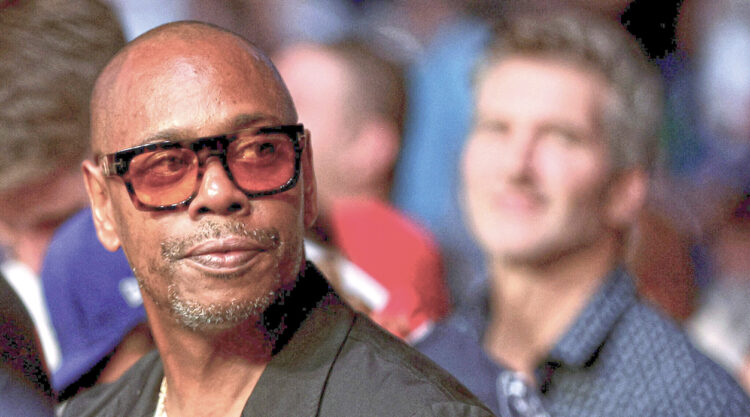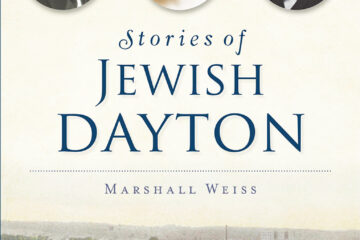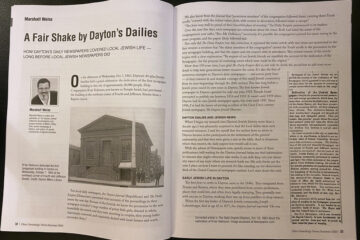Does Chappelle get a free pass on hate?

Opinion
By Marshall Weiss
How do you respond when a dear friend spews hate? When someone who has championed you — who has held up your spirits in your darkest hours — publicly ignites vile judgments against people who are continually denigrated and othered?
Where do you begin? This, I believe, accounts for the thundering silence across the Miami Valley regarding Yellow Springs resident Dave Chappelle’s new and final comedy special for Netflix, The Closer.
Released Tuesday, Oct. 5, The Closer today ranks as Netflix’s third most watched program in the United States.
Early in The Closer, Chappelle compares Asian people to the coronavirus. Throughout, he questions and mocks the legitimacy of transgender people in ways that are just ugly, while sharing stories of the transgender comedian whose career he helped. She took her own life in 2019 after receiving a barrage of hate on Twitter for defending Chappelle’s anti-trans jokes. Chappelle strongly implies in The Closer that he lays her suicide at the feet of transgender people. He tells the audience he has set up a trust fund for her daughter.
Chappelle also attacks Jews in ways that are centuries old but still in vogue among antisemites.
The veteran stand-up comedian talks of his idea for a movie:
“In my movie idea, we find out that these aliens are originally from earth — that they’re from an ancient civilization that achieved interstellar travel and left the earth thousands of years ago. Some other planet they go to, and things go terrible for them on the other planet, so they come back to earth, (and) decide that they want to claim the earth for their very own. It’s a pretty good plot line, huh? I call it Space Jews.”
How is this antisemitic? It plays into the long-held belief among Jew haters that the Jews as a people control the goings on of the world’s affairs for their nefarious benefit. That Jews are alien, not like everyone else. It also buys into the most ignorant stereotypes of false anti-Israel narratives, absent any understanding of the history of the Jewish people and the Middle East.
Chappelle returns to the Jews toward the end of his program. He talks of a slave in the pre-Civil War South who buys his freedom from his owner, buys his own land, and then buys slaves of his own:
“Not only was he a slave owner, he became a slave breeder and employed tactics that were so cruel even White slave owners were like, ‘Yo, my man.’ He was a wild dude, but he did it because that’s what successful people did at the time. How could a person (who) went through slavery perpetrate the same evil on a person (who) looks just like him? And shockingly, they’re making a movie about him. Ironically, it’s called Space Jews.”
Now a week later, Netflix is standing by Chappelle and The Closer. Chappelle himself seems defiantly unrepentant, proud to identify as one who is under attack by the “cancel culture” movement.
From the stage of the Hollywood Bowl following the Oct. 7 screening of Untitled: Dave Chappelle Documentary, he told the audience, “If this is what being canceled is about, I love it.” For this, he received a standing ovation.
It’s disheartening to live in a time and place in which we need a reminder of the obvious: Chappelle’s mockery of Asians, Jews, and transgender people is drenched in prejudice. Prejudice targeted against any group of people is wrong.
Is Dave Chappelle anti-Asian, anti-Jewish, anti-transgender? I don’t dare answer these questions. None of us can look into his heart. But his very public words are all of these.
It reminds me of the words of another comedian beset by his own ugly problems.
In Woody Allen’s 1994 film, Bullets Over Broadway, he has a character played by Rob Reiner proclaim the ultimate statement of hubris, “An artist creates his own moral universe.”
Could Chappelle believe he creates his own moral universe? I’ve heard him refer to himself as an artist. He and his craft have brought much good to the Dayton area in general and Yellow Springs in particular. The entertainment/philanthropy partnerships and opportunities he pursues in Yellow Springs brim with excitement for expanding the hippie village into even more of a cultural hot spot.
He helped us reclaim the Oregon District with the Gem City Shine concert he put together with A-list celebrities and performers when we so desperately needed healing after the mass shooting there in 2019.
In the midst of the Covid pandemic, he was there for us again when we all needed a good laugh, with his “summer camp” outdoor series in Yellow Springs, Dave Chappelle & Friends — An Intimate Socially Distanced Affair.
We in the Dayton area like to be liked. It’s not a bad thing. That one of America’s most famous celebrities has chosen to live here and throw grand parties here elevates us in the eyes of his celebrity friends and, to an extent, to the rest of the nation. It elevates us in our own eyes.
But a true friendship is not a one-way relationship. As painful as it is to accept and navigate, our friend’s generosity and very public expressions of prejudice are both real and present. Does friendship grant a free pass when it comes to hate? Some might argue that I don’t fully understand what’s at stake.
Over several years, I’ve seen our local Holocaust survivors go out to area middle schools and high schools. There, they share their personal stories and answer students’ questions. And to a person, the survivors emphasize the same points: Stand down hate wherever you see it. Stand up for those who experience hate. Don’t be a bystander.
These days, an even better phrase has come into popular use: Be an upstander. The new Wolf Holocaust & Humanity Center museum at Union Terminal down the road in Cincinnati has an entire project and exhibit dedicated to inspiring people to become upstanders, which the center defines as “individuals who stand up for others and their rights. They fight against injustice and unfairness, and they use their character strengths to inspire action and become the best of humanity today. They are willing to sacrifice.”
Here’s hoping Dave Chappelle will choose a path toward healing and forgiveness. And that all of us in the Miami Valley use our strengths to become the best of humanity today.
Marshall Weiss is editor and publisher of The Dayton Jewish Observer.





